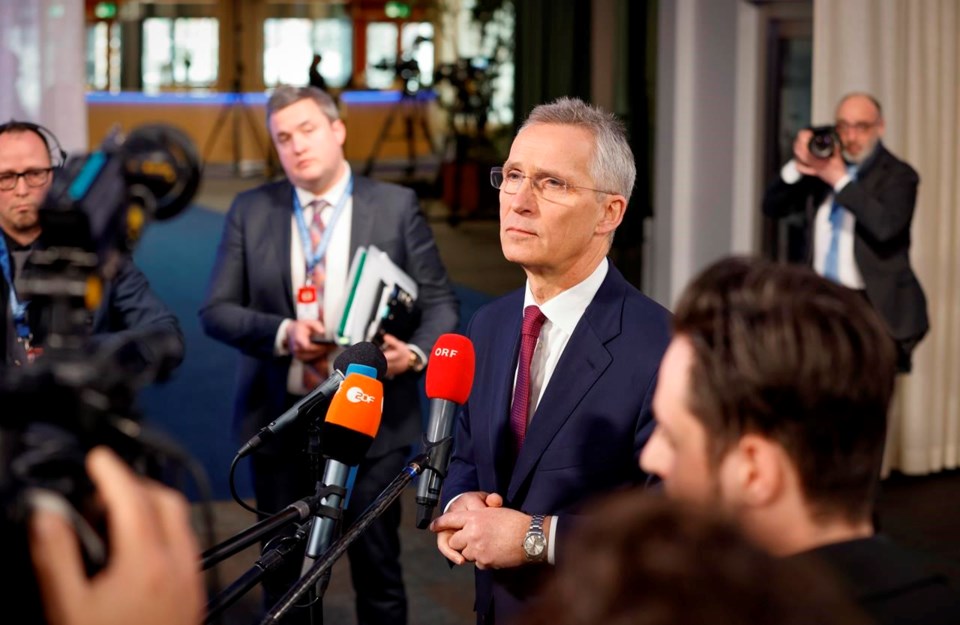BRUSSELS (AP) — NATO Secretary-General Jens Stoltenberg on Thursday launched a new attempt to get Finland and Sweden accepted as members of the world’s biggest military organization by the time U.S. President Joe Biden and his counterparts meet for their next summit in July.
Fearing that they might be targeted next after Russia's full-scale invasion of Ukraine last year, the Nordic neighbors abandoned their traditional positions of military nonalignment to seek protection under NATO’s security umbrella.
All 30 allies signed Finland’s and Sweden’s accession protocols. Almost all have since ratified those texts, but Turkey and, more recently, Hungary have sought guarantees and assurances from the two. NATO must agree unanimously for them to join.
Representatives from the Nordic neighbors and Turkey met Thursday at NATO headquarters in Brussels. Stoltenberg organized the talks after convincing President Recep Tayyip Erdogan last month to come back to the table.
Opening the meeting, Stoltenberg said that “Finland and Sweden have taken unprecedented steps to address legitimate Turkish security concerns,” a statement from his office said. “It is now time for all allies to conclude the ratification process.”
The three countries agreed that “rapid ratifications for both Finland and Sweden would be in everyone’s interest, and that their membership will strengthen the alliance,” the statement said. The goal, it noted, is to have this done before NATO's summit.
Turkey accuses Sweden's government of being too soft on groups it believes are terror organizations or existential threats, including Kurdish groups, and has been angered by protesters burning the Muslim holy book, the Quran. It has fewer problems with Finland joining.
Sweden's government has been acting though. In a new move on Thursday, it presented a draft law to parliament aimed at making it illegal to support or participate in terrorist organizations.
Speaking to Turkish journalists, Ibrahim Kalin, a top Erdogan aide at the meeting, noted that progress in the past was “pleasing and that there were developments in some fields. We expressed our pleasure over their efforts in those fields. But of course, the process isn’t over yet.”
Erdogan, whose popularity has been hit over the government’s handling of the Feb. 6 earthquake, faces an election in two months, and the issue of Swedish membership in NATO — the insistence that it must crack down on extremism — could be a vote winner.
To take the political sting out of events, Stoltenberg has tried to keep the talks low key.
In a recent about-face, he also played down the importance of both countries joining NATO at the same time. He underlined that Finland and Sweden have received assurances from some allies, led by the U.S., that they will be protected should Russia target them.
“It is inconceivable that there will be any military threat against Finland and Sweden without NATO reacting," Stoltenberg said Wednesday.
Kalin said “that the tactics and (time) pressure that are being put on us do not work. The delay is not caused by Turkey here. As long as there is progress in addressing the security concerns of Turkey concretely, we will get closer” to membership for the two.
No date nor location was set for the next round of talks.
Hungary’s position on their membership is murkier. For months it raised no public objections at all to the two joining, but a date for the Hungarian parliament to ratify their accession protocols was constantly pushed back and it’s unclear precisely when a vote will take place.
Two parliamentary delegations visited Helsinki and Stockholm this week and made reasonably positive noises in support of both countries. But some lawmakers have accused Finland and Sweden of telling “blatant lies” about the state of democracy in Hungary.
In December, the European Union — of which Finland and Sweden are members, like many NATO allies — froze billions of euros in funds earmarked for the government in Budapest to protect the bloc’s budget from “breaches of the principles of the rule of law in Hungary.”
Hungarian Defense Minister Kristof Szalay-Bobrovniczky met with his Swedish and Finnish counterparts this week too. On Twitter, he appeared to differentiate between them, thanking Sweden “for the great meeting,” but demanding “more respect from Finnish politicians instead of unjust comments.”
By June, the fates of the Nordic neighbors should be clearer. The passing of elections in Turkey in May could take some of the venom out of the rhetoric emanating from Ankara. Hungary’s parliament might also endorse their accession late this month.
If not, NATO’s presidents and prime ministers could face another summit of drama when they meet in Lithuania's capital, Vilnius, on July 11-12 — a time when they must also handle another political hot potato: agreeing on Stoltenberg’s successor at the head of their alliance.
___
Suzan Fraser in Ankara, Jari Tanner in Helsinki, Justin Spike in Budapest, Hungary, and Jan M. Olsen in Copenhagen, Denmark, contributed to this report.
Lorne Cook, The Associated Press




